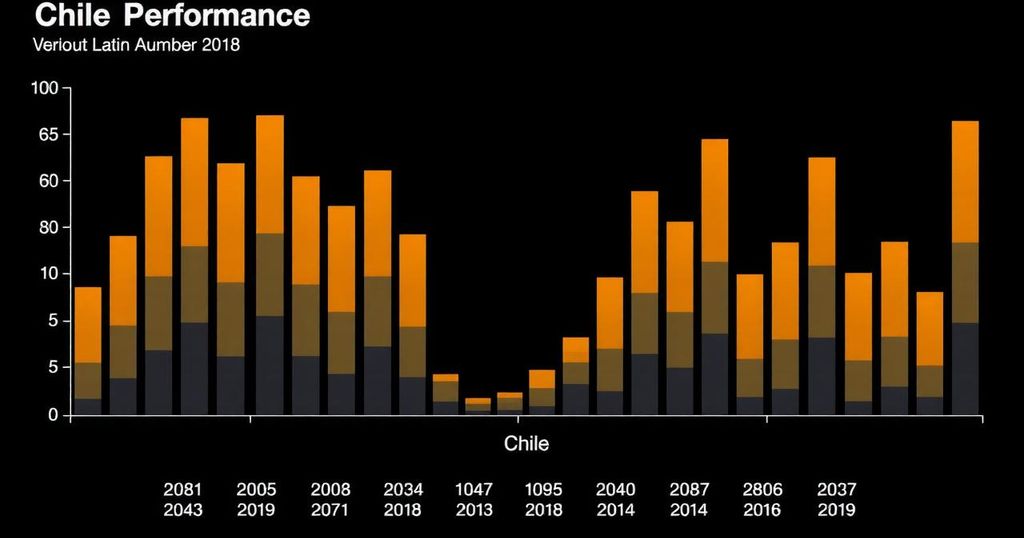Chile leads the Latin American Artificial Intelligence Index (ILIA 2024) with a score of 73.07, followed by Brazil and Uruguay. The study reveals growth in AI talent but highlights persistent challenges such as talent retention and gender equity in the workforce. Key insights suggest that AI can act as a transformative force for development, yet requires significant resource allocation and strategic action to address existing socioeconomic gaps.
On September 24, 2024, Chile’s National Center for Artificial Intelligence (CENIA) and the Economic Commission for Latin America and the Caribbean (ECLAC) announced the outcomes of the second edition of the Latin American Artificial Intelligence Index (ILIA 2024). This comprehensive study assessed 19 countries across the region, gauging their readiness for the integration of artificial intelligence (AI). Chile emerged as the leader in this evaluation with a score of 73.07 points, closely followed by Brazil with 69.30 points and Uruguay with 64.98 points. Other notable countries include Argentina, Colombia, and Mexico, categorized under “adopters.” The report highlighted a marked increase in the region’s concentration of AI talent within the workforce, which has doubled over the past eight years. However, it also noted that none of the assessed nations have attained the standards achieved by Global North countries at the beginning of this period. The three leading countries—Chile, Brazil, and Uruguay—have not only advanced in AI technology implementation but have established national strategies aimed at bolstering these technologies across all sectors. Aisén Etcheverry, Chile’s Minister of Science, Technology, Knowledge and Innovation, emphasized the importance of having such an index in shaping effective policies and strategies. She noted, “Having an index of this kind helps us move forward with sound policies and is critical for the success of these strategies.” Javier Medina Vásquez, Acting Deputy Executive Secretary of ECLAC, elaborated on the broader implications of AI, stating, “The new technological revolution, marked by artificial intelligence, has the potential to become a key driver for overcoming the development traps in which Latin America and the Caribbean is mired.” He underscored the necessity for rapid action in investment and education to avoid exacerbating existing socioeconomic disparities. The ILIA 2024 findings also point to the pressing challenge of retaining AI talent within the region, as most countries experience a talent drain, barring Costa Rica and Uruguay, which are able to attract more talent than they lose. The index suggests that while specialized human resources in AI have increased, they remain well below the levels of developed nations. Additionally, the study indicated that Chile, Uruguay, and Costa Rica possess a favorable entrepreneurial environment, reflecting higher levels of private investment and startup emergence. Chile’s governance related to AI is notably advanced, characterized by public policies that support a long-term vision for ethical AI adoption. Despite these advancements, Chile faces ongoing challenges such as ensuring equitable participation of women in AI fields and sustaining the urgency in resource allocation towards AI developments. The ILIA 2024 launch event featured key stakeholders from the AI ecosystem, including presentations from major tech companies like Google, Amazon Web Services, and Microsoft, showcasing successful AI applications. In summary, Chile’s leading position within the Latin American region on AI readiness highlights significant developments in infrastructure and policy frameworks aimed at fostering innovation and adoption. Nevertheless, continued commitment and strategic efforts will be essential to navigate the challenges and capitalize on the transformative potential of AI in the region.
The Latin American Artificial Intelligence Index (ILIA) is a critical measure of the progress and preparedness of Latin American countries in relation to artificial intelligence technologies. The second edition of the ILIA, released in 2024, evaluates the AI landscape across 19 countries in the region, assessing their capabilities and readiness for AI integration into various sectors. The study is primarily driven by CENIA and provides insights into both the advancements made and the challenges faced by the region in the pursuit of AI innovation. The index serves as a framework for governments and policymakers to develop targeted strategies for enhancing their nations’ AI competencies and addressing socioeconomic disparities.
The ILIA 2024 underscores Chile’s leadership in the Latin American AI sector, showcasing notable advancements in technology infrastructure, human talent development, and governance frameworks. While the region has seen progress in integrating AI into its economic fabric, significant challenges remain, particularly in talent retention and gender equity in AI fields. The continued focus on strategic investment and a commitment to ethical AI governance will be pivotal for the sustainable advancement of artificial intelligence in Latin America.
Original Source: www.cepal.org






